Estimated reading time: 12 minutes
You’ve outfitted your homestead with a garden, stockpiles of food, fortified windows, and the ultimate backyard BBQ area. Your kingdom is almost complete! There is only one thing missing: your four-legged friend!
A house isn’t a home without companionship, especially when you have kids around. When it comes to selecting a pup that is going to be with your family for 10+ years, consider carefully. Just like there isn’t one style of homesteading, there isn’t a one-dog-fits-all for homesteaders. Make a checklist of what it is you’re looking for in a furry friend and stick to it.
As for most homesteaders, there are a few jobs to fill on the farm. Here is a list of the best dog breeds to fill the most commonly desired pup positions…
Want to save this post for later? Click Here to Pin It on Pinterest!
Security Dogs
A security dog is different from an attack dog, just like a security guard at the mall is different from an NYPD officer. These dogs are meant more for alerting you about an intruder, rather than taking the problem into their own paws.
1. Bernese Mountain Dog
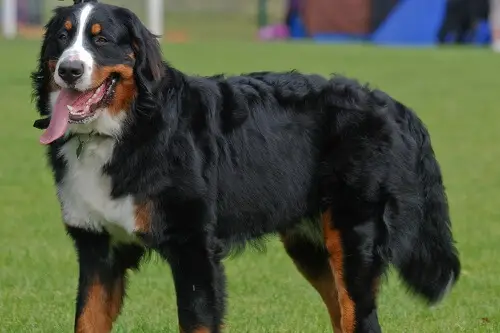
Bernese Mountain Dogs are known to be fantastic watchdogs as their bark is deep and fierce while their heart is extremely loyal to their owner.
Temperament: Bernese Mountain Dogs love cuddle time with their owner and prefer not to be alone. They are very affectionate and wonderful with kids.
Downfalls: Compared to other dog breeds, Bernese Mountain Dogs have a relatively short lifespan at around 6-8 years old.
Energy Level: These dogs have a mellow energy level and will spend their day lounging around the house or following you on walks around the property.
2. Great Dane
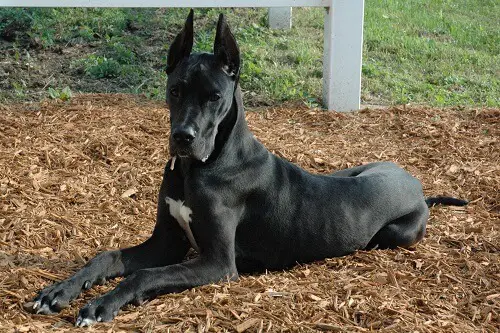
The sight and sound of a massive Great Dane are enough to make unwelcome humans and animals turn and run for the hills. Great Danes are not known for being aggressive, so you won’t have to worry about your pup chasing after an intruder (or a raccoon).
Temperament: These high-energy dogs would absolutely love some children around to play with. They may look intimidating, but they are extremely sweet and gentle creatures.
Downfalls: Great Danes don’t seem to be aware of their size, so they tend to be clumsy in smaller spaces, often knocking things over as they play.
Energy Level: Great Danes are relatively high energy and need lots of space to stretch those long legs of theirs. Once they’ve had a few good runs or walks, they are perfectly content to curl up with you on the couch after a long day.
3. Rhodesian Ridgeback
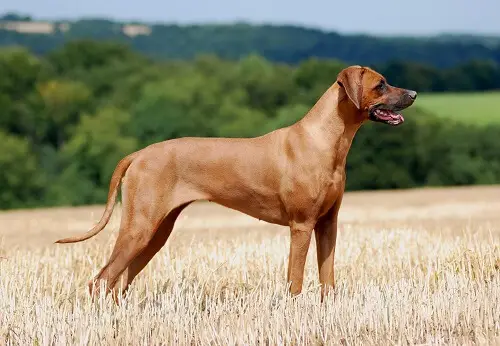
Muscular and yet lean, the athletic Rhodesian Ridgeback was the result of Dutch settlers in southern Africa breeding dogs made for hunting and protecting hunting camps. All the same, these dogs could just as easily protect your homestead as well.
Temperament: The Ridgeback is a protective dog that bonds very closely to its adoptive family and has a desire to please its owners. Your Ridgeback will need to live indoors with your family rather than live outside permanently.
Downfalls: The Ridgeback can become aggressive when he is not given enough exercise or attention from the family.
Energy Level: The Ridgeback is a very high energy dog that requires much physical stimulation. While they’ll need to live indoors with your family to be close with everyone, they’ll also require a lot of exercise and running outdoors. These dogs will be a natural fit for a homestead with plenty of space outside.
Protection Dogs
If you want a dog who is going to go to battle for you against intruders, looters, and zombies, you’re going to want a dog that is fiercely loyal and easy to train, intimidating and courageous. Here are three contenders.
4. Bullmastiff
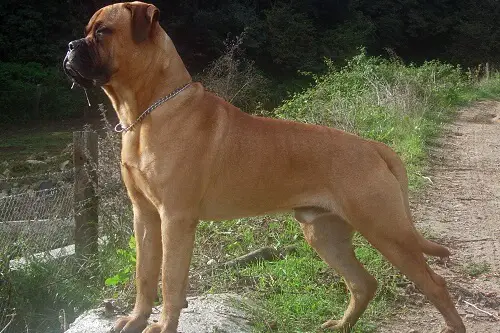
Big and brave enough to handle intruders, yet sweet and cuddly enough to show lots of affection to their family, a Bullmastiff ticks all the boxes when it comes to serving as the family guardian.
Want to start a homestead but not sure how?
Click Here to get a FREE book, "How To Homestead No Matter Where You Live."
Temperament: While Bullmastiffs are mellow, sociable and great with kids, they are extremely loyal and will go to great lengths to protect their family.
Downfalls: These dogs don’t immediately get along with other dogs, unless those dogs are already part of the family.
Energy Level: Bullmastiffs have a relatively low energy level but will certainly jump to their feet when it comes time to handle an intruder. That being said, they do well on smaller plots of property.
5. German Shepherd
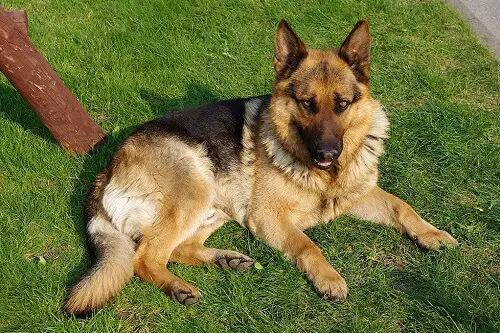
Originally herding dogs, German Shepherds are most famously in the spotlight for being fantastic police dogs. Thanks to their keen intellect, German Shepherds are easy to train, including to attack intruders.
Temperament: These intellectual dogs love mental stimulation. Play with them, take them to training classes, or run with them at home. They love to spend time with their owners.
Downfalls: German Shepherds like to dig and chew when they get bored!
Energy Level: German Shepherds are athletic and active so they require lots of space to run, or you’re going to come home to your couch cushions in shreds.
6. Rottweiler
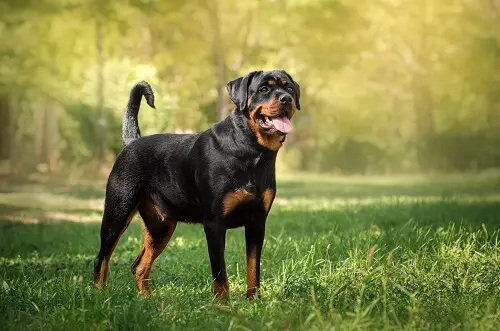
The distinctive-looking Rottweiler is a great homestead protection dog. While laid back and gentle around children and its family, the Rottweiler will become alert and very territorial when it perceives a threat. When the Rottweiler barks, you know something is wrong.
Temperament: A Rottweiler that’s been raised with a firm hand will be very calm and gentle around your family, but also confident and alert around strangers.
Downfalls: Rottweilers are known for suffering from a variety of potential health issues, including eye diseases (such as cataracts) and hip dysplasia.
Energy Level: Rottweilers are a medium energy dog. They’ll need a good workout at least once daily, but otherwise they’ll be perfectly happy being quiet and reserved while in your family’s house.
Livestock Assistance
7. Australian Shepherd
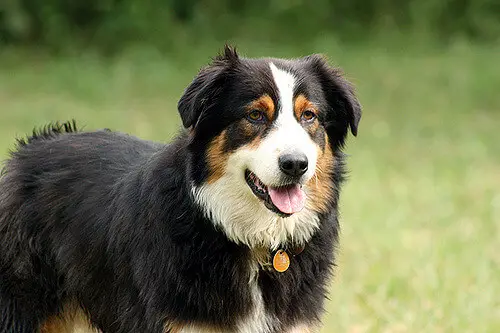
Got cattle, sheep, horses, or ducks on the homestead? Need help during your daily rounds to bring the cattle in and out of the pasture? Look no further than the Australian Shepherd.
Temperament: These super affectionate dogs are eager to please, and thus keen to learn your commands. Australian Shepherds are also famous for being great horse-rodeo dogs!
Downfalls: Australian Shepherds need constant space to run around and play!
Energy Level: Despite being such high-energy dogs, Australian Shepherds are able to intently focus while herding. They will work by your side for hours on end and are quite good at their job.
8. Great Pyrenees
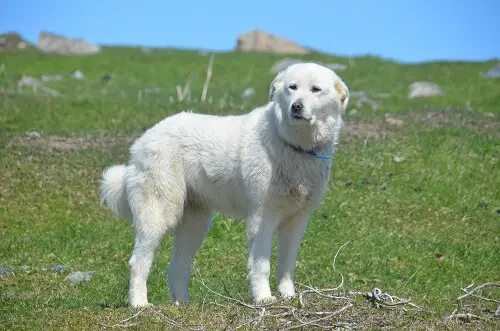
The white and fluffy Great Pyrenees were born from the beginning for one purpose: to watch and protect livestock. These dogs can spend hours upon hours watching your sheep or other animals without moving so much as a muscle, and then suddenly spring into defensive action when a threat has appeared. Your Great Pyrenees will serve as a loyal, watchful, and protective guardian of your homestead.
Temperament: The Great Pyrenees can be best described as a gentle giant when around your family. While these dogs are massive and are born with an innate instinct to protect livestock, they are also incredibly patient, mellow, and quiet around their human families.
But when threats appear, such as wolves or coyotes, the Pyrenees will become fierce and savage in its never ending mission to protect its flock.
Downfalls: The Great Pyrenees require a significant amount of outdoor space to thrive in. These are not the best choice for an indoor dog. The breed is also prone to hip-related disorders such as hip dysplasia.
Energy Level: The Pyrenees is a calm dog breed that’s happy to do its own thing protecting your animals and keeping an eye on your property. It won’t thrive when its kept indoors for too long, however.
9. Kuvasz
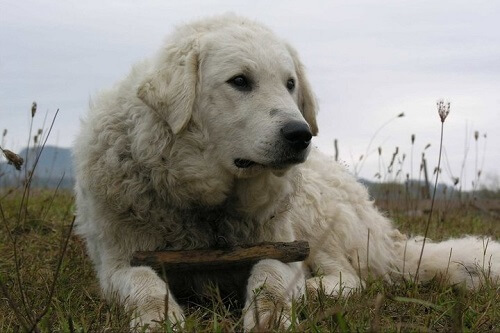
Pronounced Ku-Vaz, these fluffy polar-bear looking animals are uniquely fit to serve as homestead helpers. Kuvasz pups can be trained to watch over livestock and protect them against predators.
Temperament: These homestead dogs are quite aloof and independent. They will wander the property all day on their own, keeping an eye out.
Downfalls: Kuvasz pups aren’t the most social and don’t do too well with children climbing all over them.
Energy Level: These high-energy dogs are said to be able to run 15 miles without tiring. In other words, they need a large piece of land to wander and will be on guard round’ the clock.
Hunting Dogs
These next three dog breeds will come as no surprise in regards to hunting–it’s in their blood! Better yet, these dogs are extremely family friendly and make for the perfect companion on the homestead.
Want to start a homestead but not sure how?
Click Here to get a FREE book, "How To Homestead No Matter Where You Live."
10. Coonhound
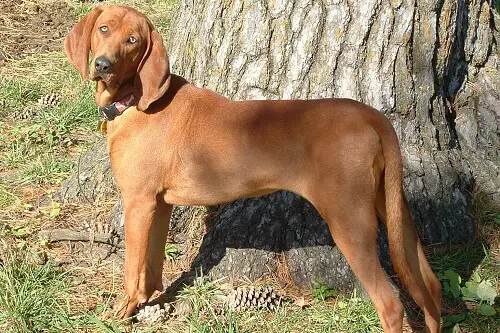
Athletic enough to take on varied terrain, outfitted with an intense nose for tracking, easy to train, persistent in the chase, Coonhounds make for great hunting partners. From raccoons to foxes, the Coonhound is always ready for the games to begin.
Temperament: Coonhounds are sociable animals that love meeting new people and even new dogs. Take them anywhere with their tail wagging!
Downfalls: Coonhounds need lots of love and attention. Leaving them alone for too long can cause doggy depression.
Energy Level: The high energy level of a Coonhound makes them excellent runners known for their speed and endurance. They’ll happily join you on an all-day hunting expedition.
11. English Pointer
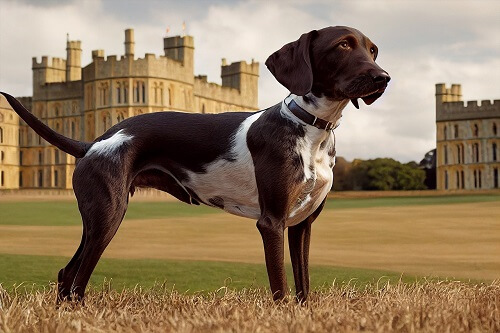
The English Pointer, also sometimes just referred to as the ‘Pointer,’ is a bird hunting dog that is known for its determination and high prey drive. If you want a dog that can vigorously go after pheasants or quail, the Pointer should be on your short list.
Temperament: The Pointer is very alert and good-natured, if also a little stubborn. You can expect your Pointer to be friendly around your family while also consistently being eager for outdoor play.
Downfalls: The Pointer is known for a strong independent streak that makes puppy training a challenge.
Energy Level: The Pointer is a very active breed that requires constant physical exercise to ensure they are kept happy. Plan on at least one good walk or play session per day.
12. Labrador Retriever
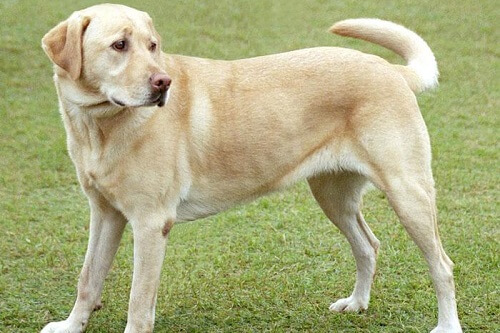
Some of the best four-legged swimmers on the planet are Labrador Retrievers. This makes them excellent hunters when it comes to fetching foul and small game in watery territory.
Temperament: Labradors are known for being some of the sweetest, most affectionate and playful dog breeds that have ever existed! They are rarely aggressive and do very well with strangers.
Downfalls: Labs are gluttonous creatures and would eat all day if they had the chance. That being said, it’s important to pay attention to their diet in order to keep them at a healthy weight.
Energy Level: High-energy labs always want to play fetch, go hunting, or run around. However, you don’t need to worry about annoying or incessant barking.
Final Thoughts
When searching for a breeder, take your time. Not all breeders are reputable or breed with the healthiest moms and dads. The outcome could be a purebred with lots of health issues. To find a responsible breeder, ask for recommendations in homestead forums or dog breeder groups online.
On the other hand, if it’s simply a furry companion you’re looking for, have a look at your local humane society or animal shelter where you can search out mixed breeds. You’ll often find Labrador or German Shepard mixes–just ask the expert staff to help you pick the right pup for you.
Want to save this post for later? Click Here to Pin It On Pinterest!
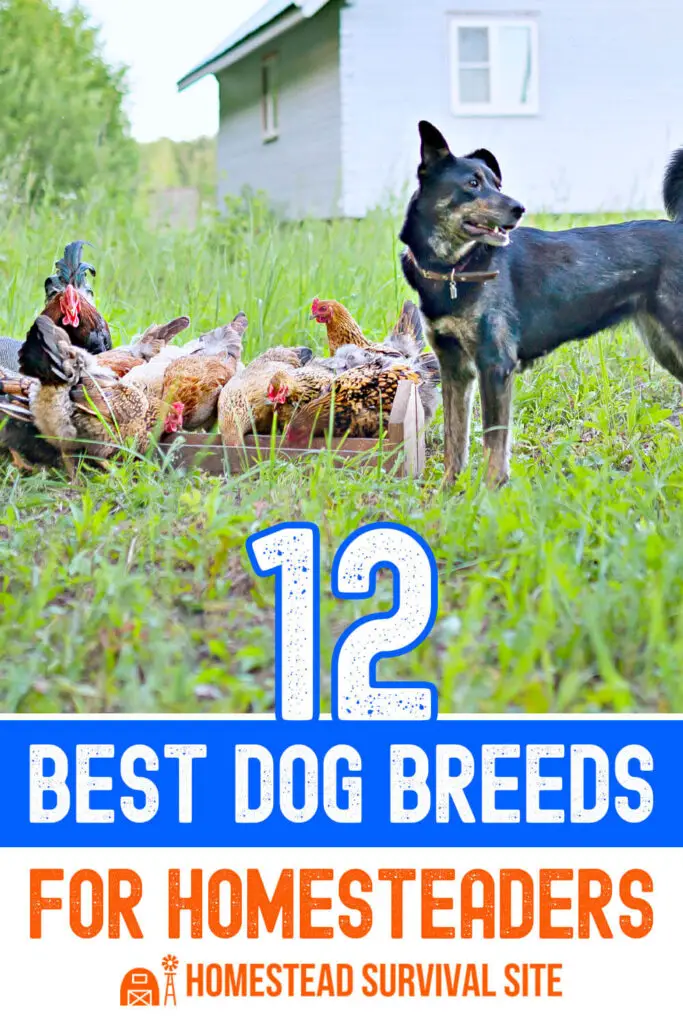
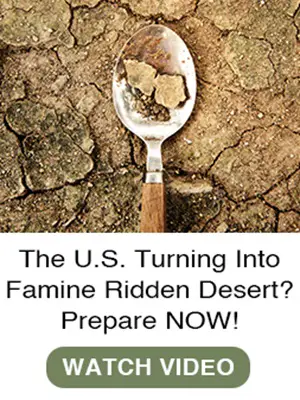


You must not know much about Norwegian Elkhounds. Otherwise, this breed would surely be on your list. They are excellent hunters (90% of elk in Norway are taken with Elkhounds), fiercely loyal, and establish a protective zone that is as large as they can see, hear or smell. They are high energy dogs and love to roam (and hunt). The only disadvantage I can think of is that they attach loyalty primarily to the alpha member of their human family, whoever that happens to be..
I agree. I have an elk hound and was wondering why it was not on the list. Elk hounds have been helping humans hunt since 5000 BC. they are the shape & size of a huskey, just about three times as strong. one elk hound can take down a deer as well as drag a dead deer 5 miles by them self. They can help with just about anything. They are super smart and beyond loyal. I have the second elk hound of my lifetime right now and very seriously am going to stick to this breed exclusively
I have had many dogs over the last 60 yrs and the best I have found for my family is a Belgian Malinois.
Very good choice
I have 2 male brothers half pit bull and boxer. They were going to be put down at 9 weeks old. I also have a dachshund and 3 chihuahua all rescues. And I live alone until I made these pups my family. They play and get along great. The big boys run and play and help round up stray chickens. My little guys all are ratters.
I’m thinking boxer. Any reason why they did not make this list
Because whoever wrote the article doesn’t have a broad knowledge of dogs. As an example, one dog mentioned has the proper breed name of German Shepherd Dog. That’s given incorrectly. In that breed there huge varieties in types and appropriateness for a homesteader. There is the AKC type which is not likely suited for protection even with training appropriate training, a fact not mentioned (and admittingly a generalization) nor are issues with their confirmation discussed. Of the West German type of GSD there are working lines and show lines, both generally better than any given AKC dog with in the scope of the article. The West German lines, especially the working (protection) lines are more suitable for some level of herding as well. Some herd large flocks of sheep daily. Furthermore there are the DDR and the Czech lines. These are basically similar, were developed separate from Eiropean and American lines post WWII under the Soviet regimes and tend to be taller and lanky and much more protective but also tend to be less of an all around dog. There is a tendency for these to be high octane protection dogs suitable to serious protection, military and police work. That info was missing on one breed. Health and cost were not mentioned. If you want a breed for protection look at the breeds government agencies use. I think bull mastiffs are great but police rarely use them because there are several breeds that simply do a better job. A boxer, especially a European boxer from working lines would make an incredible addition to the homestead if you can find one. What a breed. Research the differences between American and German Oor European boxers. Why wasn’t the English Shepherd on the list? The breed is an alert alarm dog, capable of intimidating or even biting if absolutely required, weighing either side of fifty pounds, a hunter of squirrels if trained, a herder, loves people, especially his pack, long lived and very smart. A rat terrier should have been on the list. This breed is fun, acts like a pup for years, hunts, is a ratter and a great alarm dog. I’m sure there are other areas in which the blog will excel but it’s hard to be great in everything.
Our neighbors had boxers. Their intelligence ranged from so-so to really, really stupid. The males barked at everything, right down to the grass growing. There’s no way I would ever have a boxer. I find they are very easy to intimidate though.
Perhaps the article should be about the 30 best dog breeds for homesteaders, as many other breeds have a large percentage of individuals that make good homestead dogs. A couple of breeds I would suggest for an expanded list are the Rhodesian Ridgeback, and the Black Mouth Cur which is an able protector, hunter, and herding dog.
Yes. I thought to mention curs and feists in general and Blue Lacies specifically. In a general way of speaking the Blue is herd dog meets cur dog meets pariah. It may be one of the top dogs to bet on to out survive cockroaches.
Ok, so I personally agree with most of the coments of towards this pin. I have a Border Collie mixed with pitbull and wow! What an amazing family member .He’s very good with training new pups, very good with herding my livestock,and patrols my property very well.Ben’s parents were both AKC and he was an accident or I would get another.
Really disappointed that the Newfoundland and Great Pyrenees did not make this list. The Newfoundland is an excellent dog for families with children. While they are not known for being aggressive, they are fiercely loyal to their family and protective of small children. The Pyrenees needs little to no training with livestock, as their guard instincts are superb from puppyhood. Our Pyrenees patrols 10 acres 24/7 and I can always tell if something is amiss on the property by the way she greets me. She is great with other dogs, cats and our livestock. We have had to work with her on the chickens, but it has been well worth it. If a decision had to be made with her or the chickens – chickens would have become extinct on our farm.
Great to hear. I’m on a list to get a great pyrenees when the pups come.
My female Great Pyrenees just gave birth to 13 puppies. They will be ready by Valentine’s Day if you are interested. We are located in Eastern North Carolina
Do you still a place on your waiting list for a puppy? I love the Pyrenees I have 20 acres quail goats , cows and horses I need a good companion and watchdog and they the best.
Rottweilers are great farm dogs, having been bred specifically as the “bob-tailed butcher’s dog. They are fierce family guardians, gentle with children and not prone to bark UNLESS there is something seriously wrong. They’re not for everyone. We’ve had them for 40+ years and love their tenacity, laid back attitude and gentle nature especially with the baby animals. I”m not surprised to see they did not make your list since they have a stigma attached to the breed as a dangerous breed. I am surprised to see Great Danes on your list. Not particularly a farm dog breed in my opinion. But different opinions and different breeding programs produce different types of dogs even within a known breed.
Deutscher Jagdterrier. Pound for pound you won’t find anything better. Ratter extraordinaire, retriever, upland bird, tracker, small and hardy, won’t bother livestock I could go on and on. Do yourself a favour and google them.
I like Karelian Bear Dogs as well but I will always have a Dobermann and a Jagdterrier on my homestead. Bases firmly covered.
Black mouth curs. Best dogs ever, all around hunting dogs and are very leary of strangers. Will literally make strangers leave. My black mouth cur weighs 80 lbs or so and has kept people and dogs off the property. Great dogs.
Entlebucher Sennenhund, Swiss Mountain Cattle Dog. Works great for me living alone on my little ranch with cattle and horses.
You are definitely remiss for not listing the greatest livestock Guardian dog ever! The Great Pyrenees by far has the greatest disposition, friendly and gentle dog for both livestock and family. I have grown up with German Shepherds and always loved them. But after owning a Great Pyrenees I do not believe I would own any other dog for our homestead
There are many suitable dogs for the homestead for me though it is the Turkish Kangal not Anatolian Sheepdogs that have been bred to look like them or the crosses that the European breeders try to sell you but the genuine article, big, loyal, protective and like all good Livestock Guardian Dogs they are constantly watching and alert, but each to their own.
Perhaps look in to an English Shepherd. They are all of these roped in to one dog.
We had a Belgian sheepdog, which had a touch of wolf in her on our farm. She had control of the road in front of our house w/o being aggressive or violent. Leader Dogs for the Blind actually walked their dogs in front of our farm. She was the perfect family pet, which she protected if need be. Once I had a prospective buyer for our pick up, she stood between the man and me, staring at the man. She herded anything that had two or more, sheep, chickens, etc. I actually got a herding certificate for her, I didn’t want to take the time to get the title.
Homestead dogs
Any healthy dog can be a good dog for various applications on a homestead. This can even include many mixed breeds, unknown crosses rescued from shelters, and just plain old mutts. It is all in the individual dog, the owner/family, and tasks required of the animal.
That is not to say that one can just go out and pick a dog at sight and it will be a good one for the particular homestead and owner/family. It just does not work that way. Random pairings simply work sometimes. Other times not so much. Up to being unmitigated disasters sometimes.
So, when I consider homesteading dogs, I would look for either a small pack of different breeds, or a small pack of a very, very good general purpose breed whose breed history has shown that they can, in general, be trained to do a wide variety of homestead tasks, and do at least two or three very well. That still does not take the randomness out of the equation. It sure does reduce it, but it cannot eliminate it. No matter how ‘good’ a breed is, no matter how ‘good’ the breeder is, and no matter how much training any given dog from any given breeder of any given breed can be a terrible homestead dog for any one of many reasons. Those are the risks, if you will, of acquiring a dog from someone else, rather than breeding one yourself, starting with known good breeding stock from a good initial breeder.
It can be heartbreaking, ask any breeder, but there will be dogs born that are going to obviously not be suitable for the tasks they will need to perform. Professional breeders will either put down those dogs, or sell them to people that just want a dog. Just a dog. Not one that can do a whole bunch of stuff. As long as they are not mean or vicious from a random gene, are reasonably healthy with no major ailments or deformities, then they will a great dog for someone. Just not on a homestead where they need to be able to perform correctly.
Several of the breeds that have been mentioned are all good candidates as breeds. However, it will then be a matter of the breeder, and the breed stock they use to produce their for-sale dogs. It does not matter how ‘good’ a dog might be, if it is bred and initially raised by a bad breeder, you do not want that dog. You do not want any dog from a bad breeder.
For me, it boils down to (if I cannot breed the animals myself, the way my father did) is first selecting a breed or two, and then selecting breeders of those animals that have proven track records of high rates of success producing sound dogs. That gives the best overall chance of getting what is needed for a homestead.
My personal selection, from past experience, extensive research, and the recommendations of several people I know that breed dogs, work dogs, and either do their own vet work, or have a good relationship with a good dog vet, is a small family pack of Airedale Terriers, with a good breeder or owner in the same area that is willing to help maintain genetic diversity by breeding back and forth over several years.
If one does the due diligence reseach that should be done for any breed history and capabilities, they will find a rich and varied history of Airedale Terriers performing admirably in every task required of a homestead dog, often with many individual Airedales performing several, if not most of them, concurrently.
With their inherent protective manner, especially for children, all children, not just ‘their’ children; size and weight, alertness, and intelligence, they will protect the homestead and everything within it, to the death if need be. All the while keeping an eye on any and all stock there might be, including keeping predators from fowl of all types. They can be great herders, with most of it being part of their instinctual genetic makeup, and a bit of training for the specific type of animal and their needs.
They can hunt just about anything from squirrels to cougar to deer, elk, and moose. They have been great bear dogs, wild boar dogs, police dogs, and war dogs. Several Airedales carried out complex tasks during WW I, and some were used in WW II. Many laid down their lives during the wars, both as protectors as well as couriers and scouts.
They can do so much more, given the right individual dog, but no individual dog can be expected to do everything equally well. Some things are simply to far apart in training and capabilities. Many, yes. Not all. I would put my money on the Airedale, though, as being one that can do the most as any other good homestead breed.
One thing not often mentioned in these types of dog discussions is the nature of dogs in general. They are pack animals. They were bred from wild animals that lived in packs as that was how they evolved because those that had the trait survived to breed, and those that did not often did not in enough numbers to maintain that genetic line.
It was mentioned a couple of times that some dogs require more attention than others. That can be attributed to the animal’s need for its pack. Humans can often be enough of a pack for lone dogs to do okay. It is almost always better for these types of working dogs, even if they are home and family pets, to be part of an actual animal pack, as it does provide some things a human pack cannot.
So, if at all possible, have more than one or two of a breed. After that, I believe that other breeds can be part of the pack, if introduced from birth, or the Alphas are of the type that will allow integration of outside dogs to the pack.
This is, as always, just my opinion. So please do your own due diligence about any breed you are contemplating, and all breeders and vets you are considering using. And if you run across a dog that ‘just fits’, no matter what it might be genetically, then you are one lucky person indeed.
Great Pyrenees dogs will generally wander off faster than most of the other LGD, that’s why there are so many crosses. A Newfoundland would be out of his element if he had to work in any amount of heat at all
Thank you for your posts. For the most part they are enjoyable and informative; however, I disagree with your assessment of Border Collies regarding being destructive if inside a house. If a dog becomes destructive, it is because they are frustrated. The most common reason dogs become destructive is because they are not getting sufficient exercise. Cesar Millan, the Dog Whisperer, teaches us that dogs need 3 things; exercise, mental stimulation (training) and love; in that order with exercise being the most important. In addition, dogs are pack animals. If a dog is isolated outside, they become emotionally unsound because it is similar to putting a person in solitary confinement. They either need a pack of dogs for companionship or to be part of a human “pack” which is possible when living inside houses with a loving human family. Border Collies are one of the most intelligent breeds of dogs. They need a great deal of exercise and mental stimulation, more than most breeds. If your lifestyle cannot provide a Border Collie with what it needs, I encourage you to get a different breed. Please take your dog(s) to obedience training so a dog understands what is expected of it. They want to please you but are not capable of mental telepathy. Obedience training is a great way to build a bond with your dog and to learn about what dogs need so they live full, satisfying lives.
How about Rottweilers? They are a very loyal, easy to train, and can be very intimidating. There was a bully that tried to push my granddaughter around. The dog pushed the bully to the ground. The bully peed his pants and never came around again
Nice to see some real discussion, but the problem is that we human often engage our egos and some trainers and breeders are just scumbags who are trying to make money or they think they know everything, but they’re just inflating their own egos and trying to appear to be knowledgeable.
So I tell people, always keep your mind open as well as your eyes, nose and ears. Don’t believe that anyone person knows it all. Dogs work for me, they love me, but I’m not a breeding expert and I won’t do a disservice to dogs by dabbling in it. Even I take a risk on my ability to judge a dog or the human I am trusting is on the up and up.
There are always exceptions with dogs because regardless of the breed, the breeder, the country, genetics all play a part, good or bad in how a dog turns out and how you raise it and treat it will make the final dog what it is. It’s a fact that European breeders have a different view than American breeders. Sorry to say, but AKC registration doesn’t guarantee a damn thing.
I have had a few different breeds and I am a dog trainer. What do I like…miniature poodles and Belgian Malinois which are one of four breeds related to the well known Alsation or German Shepherd. I also like Golden Retrievers and labs because they’re spunky but sweet. Most Rotty’s I have seen are poor specimens, but the very first one I worked with was something else. So again, I keep an open mind and treat the big dogs with the same care as the little ones. And I learn how to relate to them and understand their level of independence or need for attention or whatever.
The dog and the owner need to get along. The more you value your dog, the better you’ll get along and the better the doo will work for you. You can try to convince me otherwise, but I am certain, a loved dog will ALWAYS perform better for it’s owner. Cops or military guys who don’t work well with their dogs are never a good team. And people who trade dogs until they get a perfect breed and experiment with training (confusing the dog) are looking for a magic wand should buy a robot dog.
I agree the choices or the list could be expanded a little bit. Sometimes we think we need a specific thing when the dog we have might be versatile enough to do what we need.
Why” don’t you talk about “CATs” I have a BENGAL he hunts and keeps the geld rats down Does a dog do that ? Dogs are ok but a cat is very sellf reliant ! Again why don’t they have more on cats ?
We raise and train service dogs from our Australian Shepherds. We will NEVER lack tinder to start a fire, trust me. There is enough hair after sweeping to start a bonfire, but loyal we will never own another breed.
The only dog I will ever own will be an Australian Shepherd. loyal, loving, big enough to scare, but not too big to care for. Wonderful dog breed, naturally smart, and a good companion.
What do you think of Pitbulls raised in doors
The title is incorrect, it should have been “Eight good dog breeds Homesteaders should consider.” Any article that states “the best” or “the only” needs to be 100% correct, and this article is lacking meeting that criteria.
For hunting dogs, they list a retriever and hound, but what about pointers, setters, and spaniels?
For herd dogs I saw an Australian Shepherd but what about Border Collies?
Over the years I’ve gotten several excellent dogs by checking all the shelters and rescues in the area to see what was available, going to visit them, and have brought home four really good family friendly and protective dogs this way. Many years ago, we found a hunting dog that had been abandoned on a rural farm road at the end of pheasant season. We didn’t recognize the breed and neither did the veterinarian until a few years later he handed me a small paperback book titled “Vizsla” (Hungarian Pointer), with a perfect picture and description of the best bird dog I’ve ever had, and I’ve had three others since. The Vizsla breed has since been modified by breeders in the USA, so I don’t know if the ones available today would be of the same caliber.
Anatolian Shepherd
Well the best dog breed can be any dog that bonded with you. A breed isn’t an answer. I know this will never make you post but the truth is what it is.,have you ever lived the need for your dog to protect?
My choice would be a doxwa or pugwa. We have both. One is a dauxhound chawawa mix and the other is a pug chawawa mix (forgive my spelling never could spell the names right).
I am disabled and one day when my husband went shopping there was someone who robbed a neighbor when he was taking a bath. The scumbag saw the car was not in our drive and tried to break in to our house. My 2 small dogs attacked this guys legs and he kept crying get them off me. I called them off and he ran away as fast as he could leaving a big puddle of blood behind him
If you’re a retired couple with a small yard living in a small house then a toy Manchester Terrier is perfect. They are barkers to warn you, rat terriers to keep your yard and garage clean. Don’t cost a fortune to feed them and little poop that disappears in the grass. They love to sit with their owners and are lovable. Just what we need. 😊